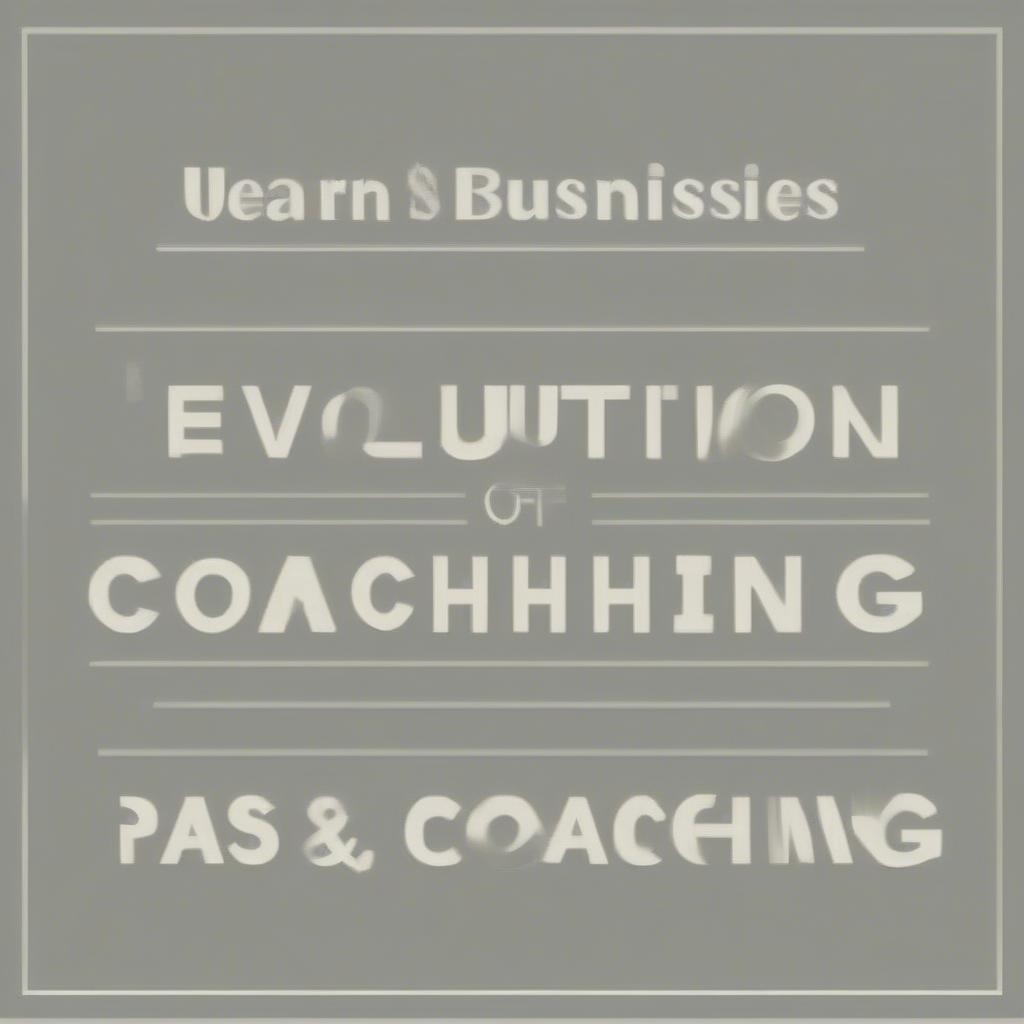
The business world is constantly evolving, and with it, the need for effective leadership. That’s where executive coaching steps in, becoming less of a luxury and more of a necessity for high-performing individuals and organizations. But what exactly is driving this surge, and how can you, as a coach or business owner, tap into this lucrative market? Let’s dive deep into the world of executive coaching and explore how to navigate its exciting opportunities.
The Why Behind Executive Coaching’s Ascent
The Evolving Landscape of Leadership
Gone are the days of rigid, top-down management. Today’s leaders need to be adaptable, emotionally intelligent, and capable of inspiring teams through change. This shift demands more than just technical expertise; it requires a nuanced understanding of human dynamics and the ability to cultivate a growth mindset. Traditional training programs often fall short in these areas, creating a gap that executive coaching is uniquely positioned to fill.
More Than Just a Mentor
While mentorship offers valuable guidance, executive coaching is a distinct discipline. Mentors often share their own experiences, while a coach focuses on unlocking the client’s potential through powerful questions, active listening, and customized development strategies. This tailored approach is crucial for executives facing unique challenges and ambitious goals.
The Pressure Cooker of Corporate Life
The modern executive often operates under immense pressure. Increased competition, rapid technological advancements, and the constant need for innovation create a demanding environment. Executive coaching provides a safe space for these leaders to reflect, strategize, and develop coping mechanisms to navigate the stresses of their role, boosting both their personal well-being and organizational performance.
Identifying the Key Coaching Trends in Executive Development
Understanding the current trends is essential for positioning yourself effectively within this market. Here’s what’s shaping the landscape of executive coaching:
Focus on Emotional Intelligence
Emotional intelligence (EQ) is no longer a "soft skill;" it’s a critical component of effective leadership. Coaches are increasingly incorporating EQ development into their programs, helping executives understand their own emotions and those of others. This leads to stronger relationships, better communication, and improved team performance.
Emphasis on Resilience and Adaptability
The ability to bounce back from setbacks and adapt to change is vital in today’s business world. Coaches are working with executives to cultivate resilience, develop coping strategies, and embrace change as an opportunity for growth. This includes techniques like mindfulness, stress management, and fostering a growth mindset.
Growing Demand for Diversity and Inclusion Coaching
Organizations are increasingly recognizing the importance of diverse and inclusive leadership. Coaches are now specializing in helping executives understand and address unconscious biases, create inclusive team environments, and promote equitable opportunities. This shift is not just ethically driven; it’s also proven to improve innovation and profitability.
The Rise of Virtual Executive Coaching
The pandemic accelerated the adoption of virtual coaching. This format offers flexibility, convenience, and cost-effectiveness, making coaching more accessible to busy executives. As a coach, mastering the art of virtual engagement is essential for capturing a larger audience.
Defining Your Niche: Finding Your Place in the Business Niche
The executive coaching market is vast and varied. To thrive, you need to find your specific niche. Here’s how to get started:
Specializing by Industry
Consider focusing your practice on a specific industry like technology, finance, healthcare, or non-profit. Industry knowledge will allow you to speak the language of your clients, understand their unique challenges, and offer more relevant solutions. For example, a tech executive might need coaching on agile leadership, while a healthcare leader might require guidance on navigating regulatory changes.
Focusing on Specific Challenges
Another approach is to specialize in specific executive challenges, such as leadership transitions, conflict resolution, strategic planning, or improving executive presence. This allows you to build deep expertise in a particular area and become a go-to resource for executives facing those issues.
Targeted Demographic
You might choose to focus on coaching specific demographics, such as women in leadership, emerging leaders, or C-suite executives. Understanding the unique experiences and challenges of these groups allows you to tailor your services effectively.
The Power of Personal Branding
Your personal brand is how you differentiate yourself from other coaches. Be clear about your values, expertise, and target audience. This involves crafting a compelling online presence through your website, LinkedIn profile, and content marketing efforts.
How to Become a Sought-After Executive Coach: Steps to Success
Once you’ve identified your niche, you need a strategic plan to attract clients. Here are some actionable steps to build a successful practice:
Step 1: Building a Solid Foundation
- Get Certified: While not always mandatory, professional certification from a reputable coaching organization adds credibility to your practice. Research the best fit for your niche and ensure their curriculum aligns with your values. Look into certifications like the International Coaching Federation (ICF).
- Sharpen Your Skills: Continuous professional development is crucial. Invest in workshops, courses, and resources that enhance your coaching techniques, deepen your understanding of leadership dynamics, and stay up-to-date with the latest coaching trends.
- Develop a Coaching Methodology: Having a defined methodology that aligns with your niche ensures consistency and demonstrates your expertise. This could involve using frameworks, assessment tools, and targeted interventions.
Step 2: Marketing and Outreach
- Craft Compelling Website: Your website is your digital storefront. It needs to clearly articulate your coaching services, value proposition, and client testimonials. Optimize it for search engines (SEO) using keywords like executive coaching, your specific niche, and target audience.
- Leverage LinkedIn: Establish yourself as a thought leader on LinkedIn. Share valuable content, engage in discussions, and network with potential clients. Optimize your profile with relevant keywords and showcase your expertise.
- Network Strategically: Attend industry events, conferences, and webinars to connect with potential clients. Partner with HR professionals and business leaders who might refer clients to you.
- Offer Free Consultations: Free discovery calls allow you to build rapport with potential clients, understand their needs, and showcase the value of your services.
- Build Referral Programs: Satisfied clients are your best marketing tool. Encourage referrals by offering incentives or special packages.
Step 3: Delivering Exceptional Coaching Experiences
- Active Listening: Master the art of active listening. Pay close attention to your clients’ words, tone, and body language. Ask clarifying questions and demonstrate genuine empathy.
- Powerful Questioning: Effective coaching relies on thought-provoking questions that encourage self-reflection and unlock insights. Learn to ask questions that challenge limiting beliefs and expand possibilities.
- Customized Development Plans: Create individualized development plans that are aligned with each client’s specific goals, challenges, and leadership style. Use assessments and feedback to track progress and adjust strategies as needed.
- Provide Constructive Feedback: Be honest, direct, and compassionate in your feedback. Help your clients identify their strengths and areas for development.
- Hold Clients Accountable: Set clear goals and action plans. Regularly follow up with your clients to track their progress and ensure they stay committed to their development.
Practical Tools and Templates for Executive Coaches
To enhance your effectiveness, here are some tools and templates that can be invaluable:
Coaching Agreement Template:
This document formalizes the coaching relationship and clarifies the roles, responsibilities, objectives, and logistics of the engagement. It should include:
- Coach and Client Information: Names, contact details, and organizational information.
- Coaching Objectives: What the client hopes to achieve through the engagement.
- Scope of Services: Clearly define the services provided, such as the number of sessions, duration, and modalities.
- Confidentiality Policy: Outline how sensitive information will be handled.
- Payment Terms: Specify fees, payment schedules, and cancellation policies.
Goal Setting Worksheet:
This template helps clients clarify their goals and develop a realistic action plan. It should include:
- SMART Goal: Specific, Measurable, Achievable, Relevant, and Time-bound goal.
- Action Steps: The specific tasks the client needs to take to achieve their goal.
- Resources Needed: The support, tools, or information required.
- Timeline: Specific deadlines for each action step.
- Potential Obstacles: Challenges that might prevent the client from achieving their goals.
- Contingency Plans: Strategies to address potential obstacles.
360-Degree Feedback Template:
A 360-degree feedback process gathers input from multiple stakeholders to provide a comprehensive view of an executive’s strengths and areas for development. Include sections for:
- Leadership Behaviors: Communication, decision-making, strategic thinking, delegation, etc.
- Teamwork and Collaboration: Ability to work effectively with others.
- Communication Skills: Clarity, active listening, empathy.
- Overall Performance: Impact on the organization.
- Open Comments: Space for additional feedback.
Assessment Tools:
Use validated assessments like DISC, MBTI, or EQi to provide insights into a client’s personality, communication style, and emotional intelligence. The results should be used to personalize the coaching process.
Progress Tracking Template:
This template allows you to track the client’s progress over time, monitor goal achievement, and adjust the coaching plan as needed. It should include:
- Session Dates: Log each coaching session.
- Topics Discussed: Record the key topics explored in each session.
- Progress Notes: Document observations, insights, and any changes in behavior.
- Action Items: Record action steps agreed upon during each session.
- Goal Review: Regularly assess the client’s progress towards their goals.
Pricing Your Executive Coaching Services:
Determining the right pricing strategy is crucial for the sustainability of your business. Here are some factors to consider:
- Your Experience and Expertise: Your level of experience, certifications, and specializations will influence your rates.
- Market Rates: Research what other executive coaches are charging in your niche and geographical area.
- Value You Provide: Focus on the transformation you create for your clients. Highlight the ROI of your services through tangible results.
- Session Duration: Longer sessions typically command higher fees.
- Package Deals: Offering bundled packages for multiple sessions can incentivize clients to commit to longer engagements.
- Virtual vs. In-Person: Virtual sessions can sometimes be priced slightly lower than in-person coaching due to reduced overhead costs.
How Learn Business Supports Your Coaching Journey
At Learn Business, we understand the challenges of building and scaling a successful coaching practice. We offer a range of tools and resources to support your business growth, including:
Tailored Templates and Checklists
Our platform provides customizable templates for coaching agreements, goal-setting worksheets, progress tracking documents, and more. This saves you valuable time and ensures you have professional-quality resources to use with your clients.
Business Strategy and Planning Resources
We offer guides, workbooks, and tutorials to help you develop a comprehensive business strategy, covering everything from marketing and sales to pricing and client management. We also provide insights on market trends and how to tap into high-demand business niche.
Marketing and Branding Guidance
Learn Business helps you craft a compelling brand narrative, optimize your online presence, and leverage the power of content marketing. Our expert guides and tools will ensure that your message resonates with your target audience.
Networking Opportunities
Connect with a vibrant community of like-minded professionals, share your experiences, and learn from the best in the industry. Our platform enables you to build meaningful connections and collaborate with other coaches.
Business Plan Generator
Create a professional and effective business plan with our step-by-step business plan generator. This plan will provide you with the foundation you need to attract investors or to secure the funds needed to grow your coaching business.
Accounting and Financial Tools
We offer templates and guidance on managing your finances, tracking your income and expenses, and understanding the financial health of your coaching business.
Legal Resources
Access guides and templates to help you navigate the legal aspects of your coaching business, including contracts, liability waivers, and privacy policies.
The Future of Executive Coaching: What to Expect
The demand for executive coaching is poised to continue its upward trajectory. As the business landscape becomes increasingly complex, organizations will rely more and more on coaches to develop effective leaders. Key trends to watch include:
Greater Emphasis on Data-Driven Coaching
Coaches will increasingly leverage data analytics to personalize coaching programs, track progress, and demonstrate results. Assessment tools and feedback mechanisms will play an even greater role in the coaching process.
Integration of Artificial Intelligence
AI-powered tools will assist coaches in data gathering, content generation, and personalized learning experiences, increasing efficiency and scalability.
Focus on Systemic Coaching
Coaches will move beyond individual development and focus on creating coaching cultures within organizations. This involves working with entire teams and leadership groups to foster greater collaboration, communication, and accountability.
The Growth of Specialized Coaching Areas
New niche areas like digital transformation coaching, innovation coaching, and cross-cultural leadership coaching will continue to emerge, providing new opportunities for coaches to specialize.
Increased Global Demand
The global market for executive coaching will continue to expand, creating exciting opportunities for coaches to work with clients across different countries and cultures.
Conclusion: Embracing the Opportunities in Executive Coaching
The rise of executive coaching is not just a trend; it’s a reflection of the changing needs of the modern business world. By understanding the drivers behind this growth, identifying your niche, honing your skills, and embracing the power of technology, you can tap into this lucrative market and build a thriving coaching practice. Remember to leverage tools like Learn Business to streamline your operations and propel your business to success. The potential for growth in executive coaching is immense; with the right approach, you can make a profound impact on the lives of leaders and their organizations. You can be at the forefront of shaping the future of leadership development.



Leave a Reply